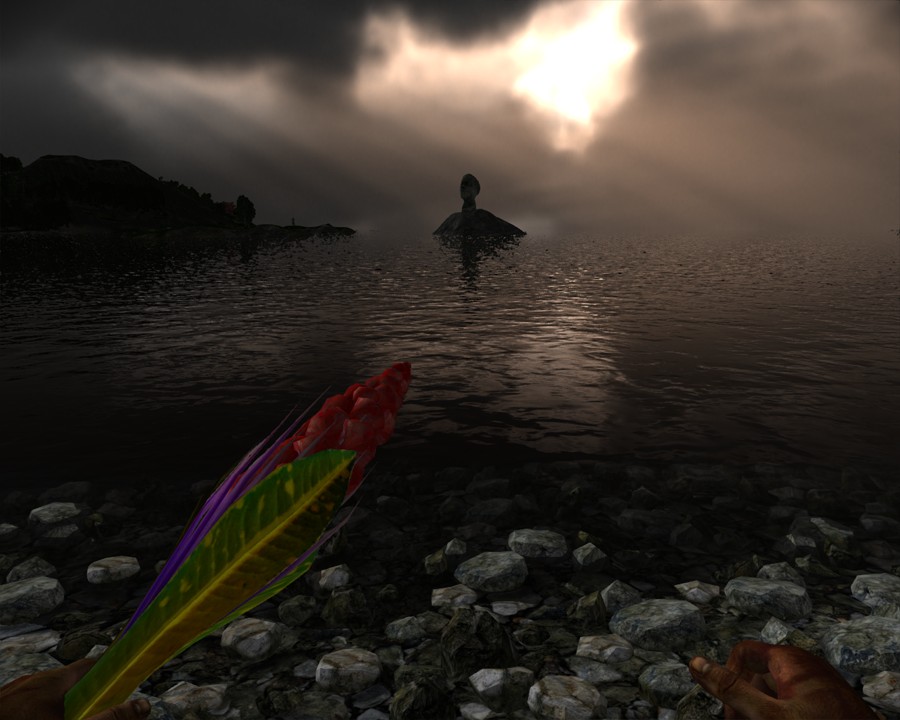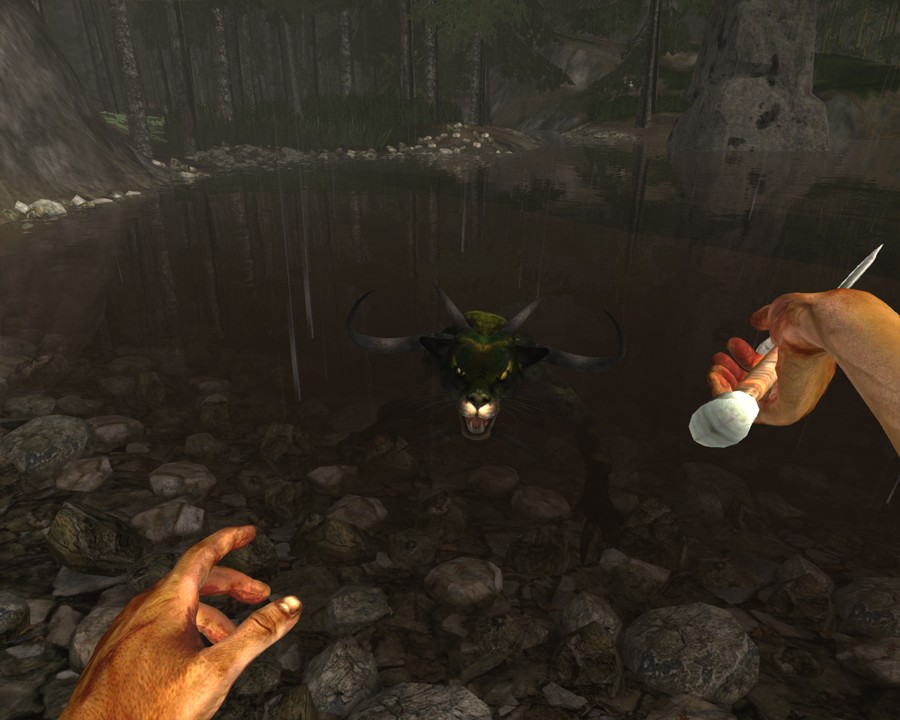When you're plague-stricken, weak from dehydration, and lost at night amid a thick copse of trees on a deserted island mountaintop, the last thing you want to hear is the sound of a hungry creature stalking you from just beyond the reach of your torchlight. The way Miasmata pushes your survival instincts to the brink as you struggle to persevere against sickness, nature, and the elements evokes a certain primal energy. You're frail, alone, and in constant danger of being overtaken by the treacherous beauty of your natural surroundings. Every little breakthrough feels like a major victory. Every stumble has the potential to set you back catastrophically. It's the constant give and take that makes the struggle to stay alive in this intense first-person adventure so gratifying.
Infected with a fatal disease and cast into exile, you begin Miasmata washed up on the shores of the desolate island of Eden. Given your lack of food, water, or medicine, your situation seems bleak, but stumbling into a nearby abandoned settlement with remnants of a makeshift research facility offers a glimmer of hope. You're left largely to your own devices, and the bigger picture of what happened to the island and the scientific researchers there slowly comes into focus as you forage deeper into the island's heavily wooded, mountainous terrain. The underlying objective might be to push toward finding a permanent cure for your ailment in order to escape the isle alive, but the thrill of setting off into the unknown to explore is just as alluring.
Eden's landscape is lovely to look at, but the unforgiving terrain makes for some harsh travel, particularly when your symptoms manifest. You're free to go just about anywhere you choose in this open landscape, though your ailing health limits how far you can go without stopping to recover. Your frail condition is an omnipresent concern that makes getting around both precarious and more interesting. As you move along the terrain, realistic physics make it possible for you to slip and tumble end-over-end from steep slopes, which is a disorienting prospect that sends any items you're carrying flying in all directions. As you get sicker, it becomes harder to climb over steep terrain, and you run out of breath far more easily. Managing your illness is so central a mechanic that it almost becomes a foe you're constantly battling. It adds a lot of great tension to the experience in a way that makes every small bit of progress all the more rewarding.

Mapping out the island and its numerous outposts is equally as important as scavenging, identifying, and using local plant life to create medicines to keep you alive. For better or worse, cartography is a very hands-on process in Miasmata that eschews auto-mapping in favor of manual use of a compass and line of sight to pinpoint your location on your map. Fragmented charts fill in some of the gaps to give you known locations to cross-reference, but it can be frustrating when you venture off course and can't plot your location because there aren't any identified landmarks in sight. Still, there's a ton to explore and map out. Dealing with mapmaking duties can be a tad tedious when you're focused on other pursuits, like simply staying alive long enough to reach shelter. Fortunately, it doesn't significantly hamper the already slow, deliberate pace of the adventure.
Remote camps linked by trails snaking around the island offer sporadic refuge: a means to rest, save the game, refresh your water supply, research new plants you encounter, and make medicine. Even with these occasional safe havens to help you, becoming lost is an ever-present concern. It happens often, since the trails split, branch off, and then disappear at frequent intervals. When night falls, this can be panic inducing, but the eerie, demonic tigerlike beast that prowls the island also ensures that any moment in your journey could turn into a full-scale freak-out as you dash blindly in terror to escape its maw. This unruly beast announces its presence by a quickening heartbeat sound, and it makes no bones about stalking you for long distances.

When you're too weak to run, frantic moments of awkward combat against this hypnotic beast have you hurling rocks, knives, axes, frying pans, and torches at it to temporarily scare it off. Your defenses are often agonizingly ineffective. Though combat is downplayed heavily, the fact that it lacks any real weight still makes it feel oddly tacked on. Other areas are similarly underdeveloped. Nature is beautifully re-created here, with storm clouds moving in, wildlife darting through the bushes, and brilliant sunlight glinting off the water. In contrast, animations for your arm movements are rough, and getting a closer look at most objects reveals a lack of detail. Though minor, these issues do detract slightly from the realistic vibe of the gameplay.
Like a nature walk gone horribly awry, Miasmata juxtaposes wonder and discovery with paranoia and terror. It's surprisingly relaxing at times and unsettling at others. The unpredictability of your quest to stay alive certainly has its ups and downs, but rough edges can't blunt the intensity of this fascinating survivalist journey.